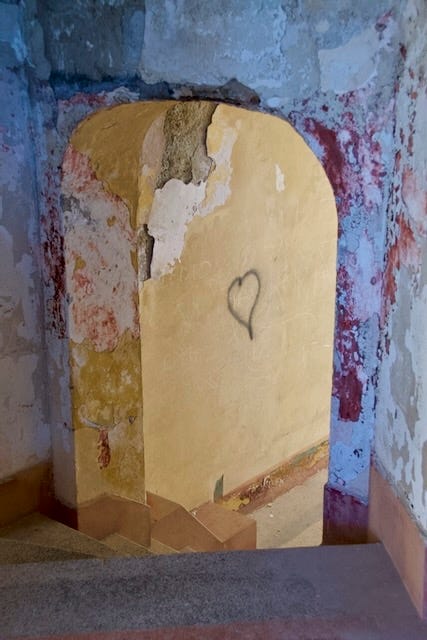When transformation is coming to meet us, it’s rarely comfortable. Since most of us also make our lifestyle one of avoiding discomfort, the winds of change are all too often met with resistance and a lack of skillset to positively face what’s happening. As a result, we too often we experience change as a healing crisis or a break down.
Whenever life is asking us to discover a new self, there is the possibility of a crisis or a breakdown. This is often not welcome, unsought, but required. Transformation has to happen to be who we long to be.
The ability to experience transformation and change as a positive experience is possible. We can break through without intense suffering. We can change without too much fight. Conscious transformation requires a capacity to allow uncomfortable emotions, sensations, and thoughts to arise and be met with trust, compassion, and surrender.
Is positive transformation an ideal? Absolutely.
The tools we have developed throughout life empower us to consciously create a relationship to unwanted emotions and spiraling negative thoughts. Tools create possibility. We can meet crises in a way that heals instead of breaks. We are able to experience transformation with hope.

We are all capable of letting change come to us without experiencing collapse. Belief of this fact is the first step.
There is a difference between choosing a transformation or change and having it be put on us. Too often, we are only willing to transform in the container of our own knowing. This is helpful and positive up to a point. Yet in any process of awakening, there has to also be a capability inside us to face the death of the ego, the rising up of shadow, and the avoided sense of self that inevitably comes with a process of true transformation.
Why do so many of us have difficulty experiencing change? Because we are unwilling to let go enough to change. Control inhibits transformation.
When life gets scary or our construct of reality is being challenged, all of our coping mechanisms come to the forefront. Our fears get loud. Our negative self feels like it finally has a reason to exist and take us much space as it wants. We lose touch with what we are capable of as all of the voices of anxiety, fear, and panic come to the forefront. Any emotion we avoid makes itself known. All of who we are seems to be who we have spent time not wanting to be.
The hard part about all this, aside from just living with it? We don’t know how to transform through these aspects of the self because we fight so hard against them. These are the aspects of ourself that we have sectioned off and labeled as “bad”, “unacceptable”, “unloveable”, and “gross.”
What can make us face these aspects of self and move through them to transform ourselves into who we want to be? Health problems and psychological break downs are a great place to start, right? It isn’t like we are going to look at these parts of ourself and go as deep as we need to without these kinds of prods, are we?
Of course we want to face ourselves through the container of our own willingness. That’s controllable and safe. However, whenever we can maintain control we are missing out on a true spiritual opening. When life asks us to change, we are being invited to transform into something unknown and often, honestly, unwanted - especially at first. We are being asked to let go of control and let in the true light of our own being.
How do we do transform without getting in the way?
What are tools that allow for transformation to occur in a positive way?
What opens doors and creates surrender into the process of breaking without crisis?
Allay Fear
A lot of times the beginning resonance of a looming breakdown starts with fear and our inability to tolerate facing what we are afraid of. Sometimes this fear is around physical health or what will happen if we face the fear.
It is impossible to move through a breakthrough effectively without making sure that you don’t have a reason to be scared.
This means seeing a doctor if you are have a physical health fear. This means building a healing team. Perhaps creating a support network ahead of time is what you choose, especially if you are afraid that facing your fear is going to cause you to be incapable of functioning.
Without facing fear and giving fear space to speak, surrender is impossible and suffering is inevitable.
Let Go Of What You Know
I write this understanding that for most of us this is an impossible feat. Most of us really can’t let go of what we know or think differently than how we know to think. After all, we are what we think, right? Up to a point maybe.
What else is there if you stop thinking? How do you know who you are without your thoughts?
When I write about letting go of what you know and think you know, it’s about tracking what comes up when thoughts are consciously quieted and not latched onto. Because so many of us think our way into being, we easily forget that we are a lot more than what we can understand in our limited thoughts and our habitual thought patterns.
A practice in which thoughts are not a prominent way of being as our life and as our self is, on the most basic level, what will make it possible to experience a situation that can put us into a crisis or breakdown without losing it.
Only by making the ability to think a choice and not a necessary part of who you are can you allow yourself to be greater than your thoughts.
People who can meditate, quiet the mind, and withstand sensations as their body’s messages are more likely to positively undergo difficult situations in life. To be effective, meditation needs to be a practice. Meditation is not something to be embraced as a breakdown looms or in fear of a crisis. The choice to be with the quiet self in a cultivated way is integral to thriving in the unknown.
In the center of any practice is a question to meet again and again…
What emotions and sensations arise when my thoughts go away?
Now, after completing my plug for personal cultivation yet again, here is are the tools needed to successfully ride out a life event from break down into break through.
Meet the Uncomfortable
Meeting the uncomfortable without avoidance or disassociation is the first and most important step whenever we are faced with unwanted life change. The discomfort can be physical, health related, sensational, or somatic. Discomfort can show up as racing thoughts, unwanted emotions, unbearable experiences, or simply a desire to act in an unfamiliar way. To meet the uncomfortable that is arising with our entire being in a complete flow of acceptance is not possible. One hundred percent yielding is an ideal. Try for good enough. Allow time and space to confront the discomfort with curiosity. Your interest will alleviate some of the pain of your own suffering.

A break through involves needing to embrace discomfort. Our default ways of dealing with discomfort are going to also be our technique for facing any healing crisis. Tendencies to avoid, shut down, get confused, abuse, self sabotage, get lost, or run away are how we trick ourselves into justification. Ignoring the signals that are coming from discomfort is a known negative.
When discomfort arises and cannot be ignored, you are going to want to follow the familiar path of seeking comfort in the known negative.
This is why it is so important in regular life to get comfortable with discomfort. By regularly embracing discomfort, positive neural pathways are created for dealing with discomfort. If we cannot face every day discomfort, a breakdown level of discomfort is going to be impossible to contain. Without tools, there is a need for a strong intent to face the uncomfortable and also trusted support. To learn how to face discomfort in the midst of breaking down requires perseverance and humility.
Facing the uncomfortable necessitates having tools. The more tools you have, the easier it will be to experience a breakthrough. Let yourself build your tool box through what calls to you.
Work with people who have tools and learn from them.
Find practitioners you trust to support you through anything - physical, spiritual, mental, and emotional.
Get out of your own head and into the world of people who know how to work with discomfort.
Don’t just rely on videos. Get feedback from live people. There are a lot of us in the world and tons of techniques out there waiting for you.
By building a repertoire of people and tools, you are giving yourself the power to face a break down and gauge your unique needs for support.
Re-BE
So often when we are facing any sort of break down, we try to be as normal as we possibly can. We compulsively go about life as usual. We hold it all together. We fake it. We seek the comfort of known patterns and understood ways we have to create an illusion. We want to feel like what is happening isn’t actually happening. Holding it together pressurizes the stressful emotions and sensations coursing through us.
Holding it all together is our blue printed response to coping that adds to the energy of the breakdown.
In any case of breaking down, life has to stop and space needs to be taken. This is the time in life that it is most important to say, “Me first.” When you give yourself space to shake, emote, crash, grieve, and truly let go into what is happening, the sensations and emotions that are running through you do not need to overwhelm you to be heard. I know that in the modern world space to break can be almost impossible. Yet taking the time, even if it is in snippets, is more valuable than avoiding time altogether.
Whenever we are facing something hard, we have to on some level pretend in places in our lives. We may still need to work or raise our children or figure out how our insurance is going to cover what’s happening. A full break is impossible. This need to function creates an immense amount of stress.
The process of taking time to break apart is actually two fold. The first period of breaking apart time we need to take is a destress period. The second period is the processing period.
Time to de-stress is necessary to uncover the self that needs to be broken apart. Without letting ourself go through a full cycle of de-stressing, we do not have the ability to delve into what is underneath the stress.
After we have given ourself permission to de-stress, we can fall apart. We can remove the controls we have in place and allow time for our authentic and messy reactions to what is going on. This is not the time to come to conclusions. This is the time to journal, sit with, create, rethink, re-BE.
The process of taking time to break apart is one of spiraling, especially in times where we are facing long term change. We can vacillate between space to de-stress and space to re-BE. We can question everything and look within or sit like a zombie just letting reality flow through.
What is most important in creating space to re-BE is to take the time in a safe place where you can be as much of yourself as you will ever let yourself be.
Whether or not people are around you is a direct response to the question of how much you can be yourself with them. Time to be 100% your own authentic self - no matter how messy - is necessary to process life changing events.
Roles and Masks
We all have a negative pleasure side of being. The role we play allows us to be the victim, the savior, the martyr, the perfect one, the good one, the teacher, the helpless one, etc etc. The mask we wear shows people that we are who they want us to be. Allowing your unique negative pleasure self to take over is putting on a mask or taking on a role.
When you understand how you go into your own negative pleasure and and play it out, you will begin to see how you create your negative experiences. Knowing what thoughts and emotional states initiate negative pleasure reactions, enables tracking your entry into a role or mask. Through this you can discern what may give you pleasure but does not give you what you actually need.
When you enter into the role of your negative self you are ignoring your positive needs. This is not a path that points you towards awakening or transformation. It is the familiar path to a death of self.
The negative pleasure role is absolutely going to rear its head in the midst of transformational breaking down. Whether or not you can differentiate between it and your unknown self is a necessity for a successful transformation into something more positive.
When you familiarize yourself on a day to day basis with how you let yourself feel good by NOT being yourself, you will start to unwind the pleasure you get in being something other than your self.
Your true self is hidden behind the role you play to get what you want or need without having to tell anyone the truth or show anyone what you want to hide.
Knowing who you are and being able to admit to it will provide you with more awareness and less room for shadow and vice as you go through hard times.
Needs Layer
Similar to coming to conclusions, be aware that surface needs feel like actual need in healing crises. Whenever a need feels absolute and uncompromising, it is coming from a young place that will not let the need be met in a human and fallible way.
As an adult, you can withstand something your child was incapable of accepting - a need being fulfilled imperfectly. Your adult can compost a need into yourself by breaking it down. You can separate out the various components of need through assessment - your unmet need, what is fulfilled imperfectly, your demand for perfection, and what need is being met.
Needs layer in complex situations. We have want. We have desire. We have demand. Then we have need. Too often we confuse want, desire, and demand with need. In their infancy, needs are demanding and absolute. When we uncover a need in ourself that we feel has to be a certain way, we are getting close to an original wound. As we spiral into wounds, we break apart. We can assess how close we are by how tyrannical we are with our demand around how our need is met.
Transformation happens through the healing of our wounds.
When a need becomes simple and yielding, we are capable of meeting our own transformation. We have perspective and an adult consciousness within the need. The adult self can learn how to soften into the hurt child. Need has to become achievable to be fulfilled. A need has to be spoken out loud to break the spell of demand. A need spoken allowed is given room to soften and become relational.
For example, when a basic need for safety is identified it comes with a pretty big demand. The world is not ever going to be perfectly safe. If safety is about fearing emotional outbursts, the adult self inside us has to recognize that everyone has emotions. Asking people around us to be more clear about their emotional states may create a version of safety. This kind of softening into a need and acknowledging the adult reality of life will begin to bridge healing the wound with meeting a need at its most basic. Pretty complex, huh?
Blindspot Certainty
What is your blindspot? If you cannot answer this question, you are going to miss out on the transforming aspect of transformation. We all have blindspots. We all process them blindly! To know what your blindspot is takes some attention and a good amount of intention as well.
Compassionately understanding your blindspot is going to help you see what you are incapable of seeing throughout a break down.
At points in our lives we have all experienced deficit. Deficit is what creates blindspots. A deficit creates a void inside us. We have no idea how to experience what we cannot know we need to experience. We can search for our own voids in what we admire or resent in other people. What we judge people for or what we wish we had that other people seem to naturally have are ways to find blind spots.
If there is a blind spot around receiving support, for instance, know that this is going to be tested and needs to be considered through the process of a break down. If boundaries are a struggle, that’s going to have to be addressed.
Whatever you consistently cannot possibly feel or understand as a basic element in your own life is going to have to be faced to embrace to transform positively.

Percolate
This one is perhaps the hardest aspect of a transformational break down. To break through, we need to not know differently. We need to give space for a tiny spark of light to arise within us and grow. This is especially difficult in the inevitable huge internal push that will be present to be done with a break down already and move into the break through.
We cannot not jump to conclusions in the midst of emotional releases or thought experiments. Ultimately, a transformational call is asking you to find and be with your own core self. If you make this happen too fast, you lost the opportunity. You also most likely will have the sensations revisit over and over again until a slower self can emerge.
Allow realizations and awareness to build without making up your mind about anything. It is best to acknowledge but not take action steps until there is a clear understanding of what has to change from all angles. If a conclusion is reached too soon, there is likely that pesky shadow of avoidance playing a part in the decision. Understanding of what is being searched for within the change takes time and an unwinding of layers. Patience is necessary.
Ultimately a breakdown or healing crisis is asking you to be more yourself in your life. If you come to a conclusion too soon, you will miss the deeper lesson of the experience. Let yourself spiral. Finding you is worth the process.




